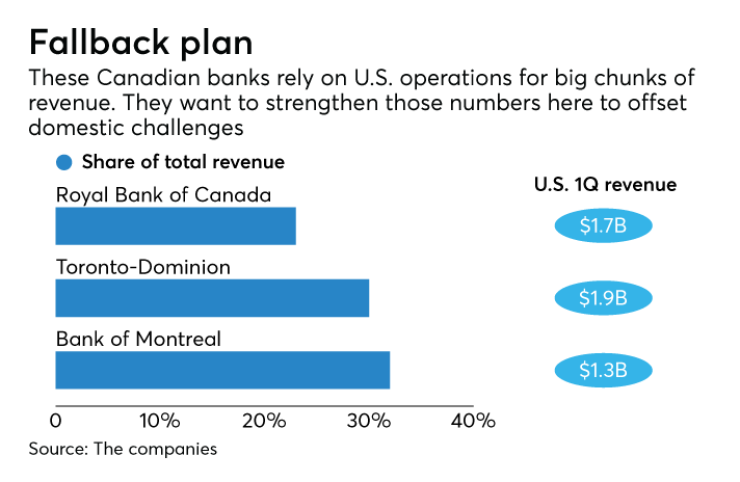Issues at home — big issues — have Canadian banks turning their gaze southward in search of a backup plan.
Several major Canadian banks have been eyeing wholesale banking, capital markets and, to a lesser extent, M&A opportunities in the U.S. as a cushion against risks that lie ahead.
Mortgage growth has been slowing in Canada, due in large part to rising home values in the Toronto and Vancouver markets. Meanwhile, recent allegations of fraud against Home Capital, the country’s largest alternative mortgage lender, have sent a tremor through Canadian bank stock prices in recent months.
Adding insult to injury, Moody’s recently lowered its ratings on several major Canadian banks over concerns about rising levels of consumer debt, which the agency said would affect the banks’ ability to withstand potential downturns in the market.
The downgrade “reflects our ongoing concerns that expanding levels of private-sector debt could weaken asset quality in the future,” David Beattie, a Moody's senior vice president, wrote in a May 10 report. “Continued growth in Canadian consumer debt and elevated housing prices leaves consumers, and Canadian banks, more vulnerable to downside risks facing the Canadian economy than in the past."
Granted, Toronto-Dominion Bank, Royal Bank of Canada and Bank of Montreal in recent days reported year-over-year profit growth ranging from 9% to 28% in the quarter that ended April 30. But their mortgage balances slumped, a possible signal that housing-market weakness and broader economic contagion could hurt the banks in future quarters.
“The mortgage market has been booming for many years now, and every once in a while people … look at the rate of price appreciation and the state of consumer balance sheets, and they get really worried and basically assume that it can’t continue,” said Meny Grauman, an analyst with Cormark Securities. “People … think that it’s inevitable that what’s happened in the U.S. will happen here.”
The largest of the bunch are ramping up growth efforts in U.S. operations and cautiously eyeballing potential acquisitions. Their existing U.S. operations, which represent anywhere from a quarter to a third of their total revenue, are already helping to lift profits.

In 2015, RBC acquired City National Bank in Los Angeles. The City National unit, which specializes in private and business banking, added $57 million to RBC’s bottom line in the latest quarter. In addition, RBC’s capital markets business in the U.S. posted a 22% year-over-year revenue increase and accounted for 53% of its total capital markets revenue.
TD also got a lift from its U.S. businesses in the quarter, with net income from its U.S. operations rising 18% year over year. Net income at its U.S. retail bank rose 21%, which TD chalked up to strong balance sheet growth driven by what it characterized as relationship banking.
And while growth at BMO’s U.S. operations slowed in the quarter because of softer loan demand, company leaders still expressed confidence that they could achieve at least mid- to high-single-digit growth in the U.S. for the second half of the year, citing the same business optimism their American counterparts have reported among their clientele.
Executives at the banks shared plans for further expansion this week.
For TD, those include organic-growth efforts in wholesale banking, which refers to fee-based corporate banking services such as treasury management and capital markets.
In the latest quarter, wholesale banking made up about 9% of revenues at the overall company, but speaking to American Banker ahead of its earnings call on Thursday, Glenn Gibson, vice chair and regional head of TD Securities in the U.S., said the company hopes to boost that up to between 12.5% and 15% of total revenue. A big chunk of that growth will be sought in the United States.
“We’ve actually had a wholesale business in the U.S. for quite some time,” Gibson said. “Historically, it’s been a smaller business, but we’ve made a strategic decision to say it’s got to be a much bigger part of our revenue stream.”
Blair Fleming, RBC’s head of capital markets and investment banking in the U.S., told American Banker by email that RBC wants to bolster its capital markets balance sheet by around 4% to 5% each year over the next five years, ultimately aiming to boost its U.S. market share from about 3.25% today to between 4% and 4.5% over the next two to three years.
“We have a well-diversified investment banking business across sectors and products and a strong secondary market platform to back that up,” Fleming said. “We have attracted — and we continue to attract — great talent to the firm. It’s a small street, and people are drawn to us because of our growth potential and our unique culture.”
More cross-border M&A is possible, but the rise in U.S. bank stocks while Canadian bank stocks have sputtered has made such deals expensive.
TD’s president and CEO, Bharat Masrani, would not rule out a potential acquisition, if the right opportunity should present itself, but he also expressed confidence in TD’s ability to increase market share in the U.S. organically.
“We have the scale. We have the brand positioning and obviously the performance not to compel us to acquire,” he said. “But should a compelling situation arise, we would look at it very seriously.”
Grauman said the banks’ plans make sense.
“I don’t subscribe to the view that Canada’s doomed, but they’re clearly constrained in this market,” he said. “There is bigger growth opportunity outside of the country. If you want to grow faster, you probably want to go outside of the country.”
Andy Peters contributed to this story.




